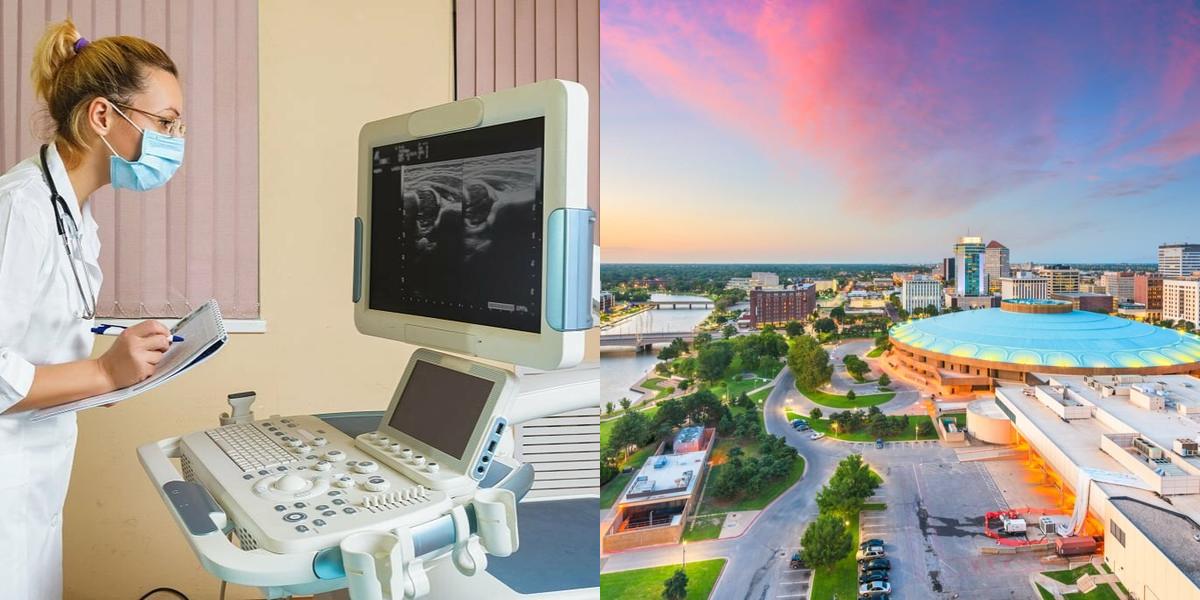How to Become a Medical Sonographer in Kansas (2025)

Becoming a Diagnostic Medical Sonographer starts with understanding the journey through sonographer schooling and finding the right sonographer program. Dive into the essential steps, requirements, and insights to embark on this rewarding healthcare career path.
Key Points
- Diagnostic Medical Sonographers use specialized equipment to create images of internal body structures, aiding in medical diagnoses and treatment plans.
- Sonographer programs typically last 2 to 4 years.
- In Kansas, the average sonographer salary is $85,870 per year.
Career Paths and Opportunities after Becoming a Diagnostic Medical Sonographer
Once you have obtained your certification as a Diagnostic Medical Sonographer, there are several career paths and opportunities available to you. Here are some potential options:
-
Hospital Settings: Many Diagnostic Medical Sonographers work in hospitals, performing ultrasound exams on patients in various departments, such as radiology, obstetrics and gynecology, cardiology, and emergency medicine. Working in a hospital setting allows you to gain experience in different specialties and work with a diverse patient population.
-
Private Clinics: Private clinics and imaging centers also employ Diagnostic Medical Sonographers. These settings often offer a more relaxed and specialized environment, focusing on specific areas of sonography, such as musculoskeletal or breast imaging.
-
Specialty Areas: As a Diagnostic Medical Sonographer, you can choose to specialize in a specific area of sonography, such as abdominal, obstetrics and gynecology, vascular, or pediatric sonography. Specializing allows you to develop expertise in a specific field and may lead to higher salaries and career advancement opportunities.
-
Education and Research: Some Diagnostic Medical Sonographers choose to pursue careers in education or research. They may work as instructors in sonography programs or contribute to research studies to advance the field.
-
Management and Administration: With experience and additional education, you can transition into management or administrative roles within healthcare organizations. These roles involve overseeing the operations of ultrasound departments, managing staff, and ensuring quality patient care.
-
Travel or Locum Tenens Positions: If you enjoy traveling, you may consider working as a travel sonographer or taking locum tenens positions. These positions allow you to work in different locations for short periods, providing flexibility and the opportunity to explore new places.
The field of Diagnostic Medical Sonography offers a wide range of career paths and opportunities. Whether you prefer a fast-paced hospital setting or a specialized private clinic, there is a career option that suits your interests and goals.
Frequently Asked Questions
How much does a medical sonographer make in Kansas?
According to the Bureau of Labor and Statistics, the average sonographer salary in Kansas is $85,870 per year. Salary varies depending on experience, location, and employer. Moreover, factors such as certification, specialization, and additional skills can influence earning potential.
What state pays sonographers most?
California tends to offer some of the highest salaries for medical sonographers in the United States. According to the Bureau of Labor Statistics (BLS) data from May 2023, the average sonographer salary in California is $122,670. Other states with high pay include Hawaii, where salaries average $111,690, Oregon at $104,260, Massachusetts at $101,420, and Connecticut at $99,610. These states consistently exceed national averages for sonographer salaries, reflecting regional demand and cost of living considerations.
How long does it take to become a sonographer in Kansas?
To become a diagnostic medical sonographer in Kansas, it typically takes about 2 to 4 years. This includes completing an accredited educational program in diagnostic medical sonography, which can lead to an associate's or bachelor's degree. Clinical training is a significant component of these programs, providing hands-on experience in performing ultrasound exams and interacting with patients.
What do you need to become a sonographer in Kansas?
To become a diagnostic medical sonographer in Kansas, you need to complete a postsecondary educational program accredited by the Commission on Accreditation of Allied Health Education Programs (CAAHEP). This usually involves earning either an associate's or bachelor's degree in diagnostic medical sonography. After completing your education, obtaining certification through a recognized organization such as the American Registry for Diagnostic Medical Sonography (ARDMS) is recommended, although not mandatory in Kansas. Certification demonstrates your competence and commitment to the profession, enhancing your job prospects and earning potential.
Final Thoughts
Becoming a Diagnostic Medical Sonographer is a fulfilling career choice that combines healthcare expertise with advanced imaging technology. With the right education, clinical training, and certification, you can build a successful career in this high-demand field.
If this article doesn't match what you're looking for, you can check out these other articles:

Athena is Co-founder and CEO of Dreambound.



